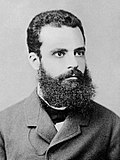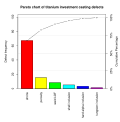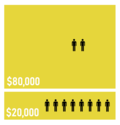Vilfredo Federico Damaso Pareto (born Wilfried Fritz Pareto; 15 July 1848 – 19 August 1923) was an Italian polymath, whose areas of interest included sociology...
32 KB (3,525 words) - 21:53, 1 September 2024
Schurmann Family (redirect from Vilfredo Schürmann)
programs such as Rede Globo, National Geographic among others. In 1984 Vilfredo, Heloisa and their children left their home, work and school and set off...
5 KB (711 words) - 15:53, 25 June 2023
Pareto chart (category Vilfredo Pareto)
named for the Pareto principle, which, in turn, derives its name from Vilfredo Pareto, a noted Italian economist. The left vertical axis is the frequency...
4 KB (462 words) - 17:28, 17 July 2024
Pareto principle (category Vilfredo Pareto)
improvement after reading the works of Italian sociologist and economist Vilfredo Pareto, who wrote in 1906 about the 80/20 connection while teaching at...
24 KB (2,770 words) - 20:15, 15 August 2024
Pareto distribution (category Vilfredo Pareto)
distribution, named after the Italian civil engineer, economist, and sociologist Vilfredo Pareto, is a power-law probability distribution that is used in description...
47 KB (6,046 words) - 20:48, 3 August 2024
The Rise and Fall of the Elites (category Books by Vilfredo Pareto)
Un'applicazione di teorie sociologiche) is a 1900 book by the Italian writer Vilfredo Pareto. It is a study of elites, exploring Pareto's conception of the circulation...
2 KB (164 words) - 15:07, 9 May 2024
Elite theory (section Vilfredo Pareto)
the three mentioned forms as well as subsequent political institutions. Vilfredo Pareto (1848–1923), Gaetano Mosca (1858–1941), and Robert Michels (1876–1936)...
24 KB (2,985 words) - 23:31, 24 June 2024
studied the ideas of the philosopher Friedrich Nietzsche, the sociologist Vilfredo Pareto, and the syndicalist Georges Sorel. Mussolini also later credited...
191 KB (21,580 words) - 07:20, 15 September 2024
There are two fundamental theorems of welfare economics. The first states that in economic equilibrium, a set of complete markets, with complete information...
35 KB (5,579 words) - 00:17, 4 September 2024
Donoso Cortés, Otto von Bismarck, Klemens von Metternich, Gaetano Mosca, Vilfredo Pareto, and Robert Michels. He wrote for publications of the neo-fascist...
115 KB (13,628 words) - 01:29, 14 September 2024






